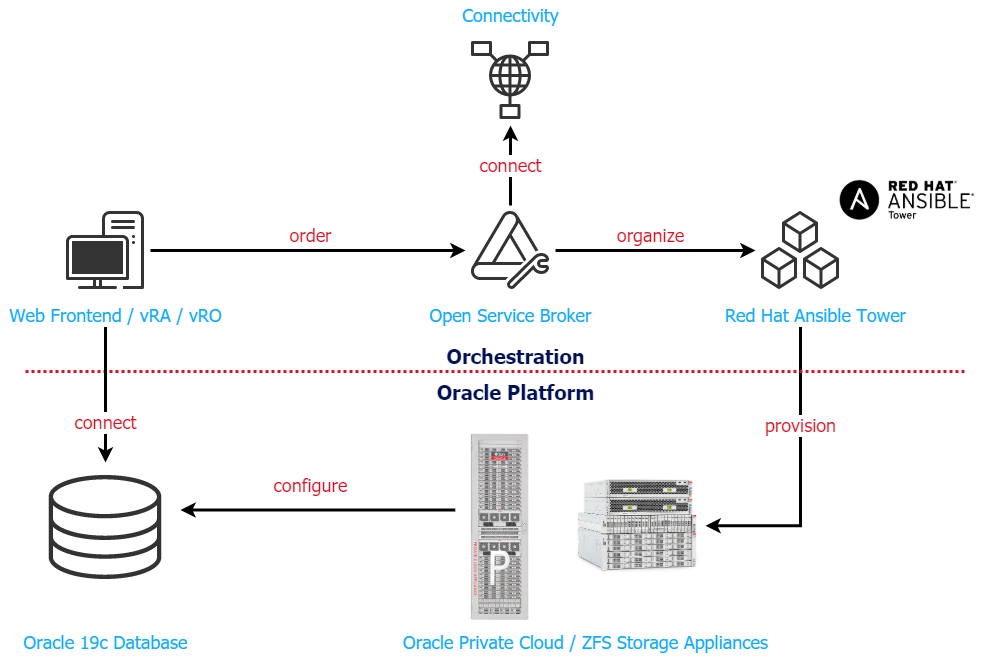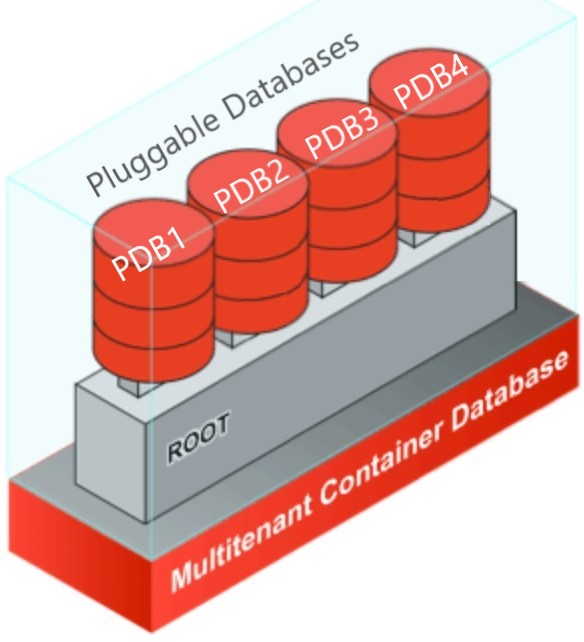MODS Regular Overview
MODS (Managed Oracle Database Service) Regular is a fully automated managed database service running on Oracle Private Cloud Appliances (PCA) and Oracle ZFSSA storage systems. The Oracle RDBMS Database Management System runs on top of the virtual Oracle Linux environment (OVM). The following picture shows the MODS architecture with the orchestration layer and the Oracle Platform layer:

MODS Regular runs on Oracle Private Cloud Appliance engineered systems. The systems are located in geo-redundant Swisscom datacenters.
With MODS Regular the customer gets a Pluggable Database (PDB) on top of a managed Container Database (CDB). The customer has administrative privileges on the PDB only. The CDB and the underlying OS is managed by swisscom/Trivadis. Due to strong isolation requirements, no access to the OS, and only very limited read access to the CDB is provided.
MODS Regular can be used with Oracle Enterprise Edition (EE) or Oracle Standard Edition 2 (SE2). The service is available with two different plans:
- BASIC: single instance database - service is deployed in one data center only
- ADVANCED: primary/standby database configuration with Data Guard (for Oracle EE), or TVD-Standby (for Oracle SE2) - the data is replicated to a second data center in order to provide higher data and service availability.
Further details about the offering can be found in the service description.
Single-/Multi-Tenant Architecture
MODS Regular is based on Oracle's single-/multi-tenant architecture.
- For up to three PDBs per CDB no Oracle multi-tenant option/license is required for Oracle EE and SE2 edition.
- For more than three PDBs per CDB, the multi-tenant option needs to be licenced, this is only possible for Oracle EE edition.

An Enterprise Edition CDB can contain up to 252 PDB's. Therefore, a CDB can be used for database consolidation. To decide, what consolidation strategy is most suitable, we point out some key facts:
- The PDBs in a CDB share the allocated resources like vCPUs and memory. The more PDBs you have, the smaller the usable share per PDB.
- You can leverage the benefit of the resource manager by using resource profiles.
- Database characteristics/features - like the Oracle release, the plan mode, and the backup option - are defined on CDB level and cannot be overruled by the PDB characteristics.
MODS Regular BASIC Plan
With the MODS Regular BASIC plan a database instance will be provisioned in one datacenter. MODS Regular BASIC plan does not provide geo-redundancy like the ADVANCED plan.

MODS Regular ADVANCED Plan
The MODS Regular ADVANCED plan provides a disaster recovery solution. With the ADVANCED plan two database instances - a primary instance, and a standby instance - will be provisioned in two geo-redundant data centers. Changes on the primary database will be applied on the standby database.

The MODS Regular ADVANCED plan is available for both, Oracle Enterprise Edition and Oracle Standard Edition 2.
MODS Regular ADVANCED Plan for Oracle Enterprise Edition
The MODS Regular ADVANCED Plan for Oracle Enterprise Edition is based on Oracle Data Guard, providing automatic failover capability. The following plan modes are available:
- SYNC_FSFO: synchronized log transport with fast-start failover
- SYNC_NOFSFO: synchronized log transport without fast-start failover
- ASYNC: asynchronous log transport
SYNC_FSFO and SYNC_NOFSFO provide an automatic failover mechanism in case of outage of the primary database instance (Fast-Start Failover). In ASYNC mode, a failover has to be requested by service request, and will be initated manually by the MODS Regular service team.
MODS Regular ADVANCED Plan for Standard Edition 2
The MODS Regular ADVANCED Plan for Oracle Standard Edition 2 (SE2) is based on TVD-Standby. The transport mode is always ASYNC (asynchronous log transport). The database archive logs will be applied every 5 minutes to the standby side. A failover has to be requested by service request, and will be initated manually by the MODS Regular service team.
ADVANCED transport mode is always ASYNC (asynchronous log transport).
Database Backup and Restore
Database backup needs to be enabled on CDB level (see Edit Container Database). Once the backup is enabled, the PDBs will be backed-up continously, providing point-in-time restore capabilities. The archive logs will be transferred to the backup system (ZDLRA) after each log switch. A database backup will be executed twice a day.
Point-in-time restore functionality is available in the vRA UI (see Restore PDB).
Oracle Releases and Patching
MODS Regular is available for Oracle RDBMS release 19c and newer.
In addition to the major release, we provide the three latest RUs (release updates) for new deployments. In general, we provide a new RU within a month after the Oracle release date.
See Oracle Release Editions for a detailed list of availabe releases.
Monitoring
The MODS platform (PCA, ZFS, OVM, GuestOS, CDB, PDB and DataGuard) is monitored by Oracle Enterprise Manager Cloud Control.
To simplify the management of the targets every target type has its specific metric template grouped by target role (i.e. database role). This provides a standardized and consistent monitoring across the entire platform.
Details about the monitoring metrics are available here.
